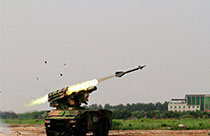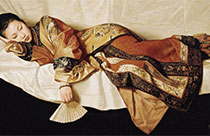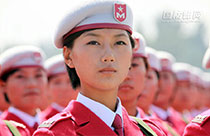

BEIJING, Sept. 2 -- After hearing that Iwao Tsuyoshi, his Japanese friend, would be visiting China, Yang Haihui, 35, booked some time off work.
"I will take him to the Forbidden City," Yang, who works for Japanese semiconductor manufacturer Renesas Electronics, said.
Back in 2002, Yang was sent to Japan for training, and Iwao was his supervisor. "He took me out in his spare time and showed me around," Yang recalled. Before he left, Iwao gave his Chinese colleague gifts.
Yang grew up listening to his grandfather's stories about his time as a soldier during China's War against Japanese Aggression. This colored his opinion of the country.
"Had I been told that Renesas was a Japanese company, I might not have accepted the job," he admitted. Gradually, however, he discovered that the Japanese people were not as he had imagined. "I have visited Japan more than ten times," he said. "I found the people to be mostly polite, friendly and diligent."
LOVE THY NEIGHBOR
China and Japan, although sharing many similarities, have a fractious relationship. Confucianism and Buddhism travelled to Japan from China, and even the characters used in Japanese are derived from the Chinese script.
Although these shared cultural characteristics have led to many Chinese having an affinity toward their eastern neighbor, the eight-year Sino-Japanese war has left a scar in the hearts of Chinese.
Ma Jiangang's uncle died fighting the Japanese Imperialist Army in the 1940s. Ma, 58, however, does not hate Japan because of this.
On the contrary, he has great memories of watching the Japanese movies and TV dramas of the 1980s, the honeymoon period between China and Japan following the normalization of diplomatic relations in 1972.
He also liked Japanese electronic appliances. "Everyone wanted a Japanese color television," he recalled. His first TV was Hitachi.
In the 1990s, however, Ma's feelings changed due to the rise of the Diaoyu Islands dispute. His daughter Huixin went through a similar change.
"I hate their leaders' visiting the Yasukuni Shrine [where war criminals are worshipped] and the denial of the Nanjing Massacre," said the 34-year-old civil servant.
A joint poll by "China Daily" and the Japanese non-profit think tank Genron NPO last year showed that 86.8 percent of the Chinese viewed Japan unfavorably, while 93 percent of Japanese had a negative impression of China, the worst since 2005.
TWO SIDES OF THE SAME COIN
At the same time, however, the two countries seem to be inseparable.
China is Japan's largest trading partner. In 2014, China provided 22.3 percent of Japan's imports. More than 23,500 Japanese enterprises have invested in China.
However hard she tried, it was not easy for Ma Huixin to eliminate all the Japanese elements from her life. Her son liked Japanese animations. Her family recently watched the movie "Doraemon: Stand by Me". The blue cat-like robot was part of the mother's childhood memories, too.
Yang Haihui said that at least one of every 10 automobiles that roll off production lines in China used chips produced by his company.
Perhaps Nanjing in Jiangsu Province, east China, is a place where anti-Japan sentiment is highest. The Rape of Nanking massacre in the winter of 1937 left at least 300,000 people dead at the hands of the Japanese. The death toll has never been officially recognized by Japan.
Taxi driver Wu Qifeng in Nanjing has a rule: Never carry Japanese. Once he discovered that two of his three passengers were Japanese, he stopped the cab immediately. "I ordered them to get out," he said. "In Nanjing, I am not the only driver to do so."
In the shopping malls, however, Japanese cosmetics still line the shelves, and books by Japanese authors are also available. "There are always people asking me 'why are there Japanese cars on the roads of Nanjing',"Wu said. He felt ashamed.
The situation was no different in Japan.
Xinhua interviewed three Japanese: A 41-year-old civil servant, a 27-year-old lawyer and a 52-year-old manager. They expressed a preference for Chinese cuisine, trust in traditional Chinese medicine and good impressions of clothes and electrical appliances made in China.
"But if I had the choice, I would only eat food made in Japan, because I always see reports of bad food quality in China," said the manager.
LOOKING FORWARD
Many Chinese, especially the young, have tried to embrace Japan.
Han Feng likes Japan. She watches Japanese movies, and buys Japanese brands.
"I even visited the Yasukuni Shrine, but the overt denial of aggression just made me really angry," she said. Han is from northeast China, where the Japanese set up the puppet regime Manchukuo.
"We really want to let go of the past," said Jiang Yicong, 22, whose great grandfather led the No. 19 Army against the Japanese in Shanghai. "But if they stop the attempt to temper with history, we could get on much better."
Last month, three Japanese cabinet ministers and Prime Minister Shinzo Abe's wife visited the Yasukuni Shrine. In July, Japan's Lower House passed a controversial security bill that would give the Self-Defense Force a greater role worldwide; this is a violation of the country's post-war constitution.
Despite these trying circumstances, the people of both countries never stopped moving closer to each other.
By April 2013, 60 percent of Japan's international students were from China. Similarly, Japan was China's fourth biggest foreign student origin country.
Yano Koji first came to China in the early 2000s to study Chinese, and is now one of the most popular Japanese actors in China.
At first, he played many Japanese soldiers -- the archetypal "bad guys".
Gradually he was accepted by the Chinese audience, and now has tens of thousands of fans. He also has a Chinese wife and a daughter.
"As an actor, I am a conduit," he said. "Everyone who works between China and Japan could be a channel, and we could unite to make a difference, so that in spite of politics, the exchanges between Chinese and Japanese people continue."
Chinese director Lu Chuan was glad to see his movie "City of Life and Death" (2009) shown by Japan's largest online video platform niconico.jp. The film focuses on the Nanjing Massacre.
When the film was shown four years ago in a cinema in Tokyo, more than 40 police officers and several police cars safeguarded the event in case right-wing extremists caused trouble, Lu recalled.
The screening was a good start, Lu said, adding that he hoped the people from China and Japan could have more exchanges "to understand each other better."
Yang Haihui observed that in Japan, elderly people who knew the war better tend to be more friendly toward China than the younger generation.
"There might be many people in both countries who were like me in the past: disliking each other but without really knowing each other," he said.
A book written by Chinese TV host Bai Yansong, who made a program about Japan several years ago, reads: "Love or hatred, put it aside [...] Understand each other first. With enough understanding, everything is possible."
 'Enemy planes' intercepted by Hongqi-7B air-defense missiles
'Enemy planes' intercepted by Hongqi-7B air-defense missiles Blind date with bikini girls in Nanjing
Blind date with bikini girls in Nanjing Amazing photos of Chinese fighter jets
Amazing photos of Chinese fighter jets Chinese soldiers participate in training for V-Day parade
Chinese soldiers participate in training for V-Day parade Painting: Lonely women in Forbidden City
Painting: Lonely women in Forbidden City China and Russia hold joint drill in Sea of Japan
China and Russia hold joint drill in Sea of Japan 'Goddess' in Taiwan McDonald's
'Goddess' in Taiwan McDonald's Female soldiers at military parades
Female soldiers at military parades Photos of campus belle doing splits go viral
Photos of campus belle doing splits go viral China celebrates Tibet anniversary
China celebrates Tibet anniversary Can mass protests defy Abe’s militarism?
Can mass protests defy Abe’s militarism? China’s watchdog teaches producers how to make reality shows
China’s watchdog teaches producers how to make reality shows As China’s rise alarms US think tanks, the importance of good ties must not be forgotten
As China’s rise alarms US think tanks, the importance of good ties must not be forgottenDay|Week